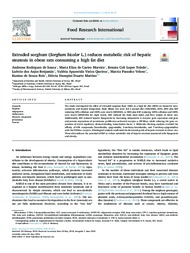Extruded sorghum (Sorghum bicolor L.) reduces metabolic risk of hepatic steatosis in obese rats consuming a high fat diet.
Extruded sorghum (Sorghum bicolor L.) reduces metabolic risk of hepatic steatosis in obese rats consuming a high fat diet.
Author(s): SOUSA, A. R. de; MOREIRA, M. E. de C.; TOLEDO, R. C. L.; BENJAMIN, L. dos A.; QUEIROZ, V. A. V.; VELOSO, M. P.; REIS, K. de S.; MARTINO, H. S. D.
Summary: The study investigated the effect of extruded sorghum flour (ESF) in a high fat diet (HFD) on biometric measurements and hepatic lipogenesis. Male Wistar rats were fed a normal diet (AIN-93M), HFD, HFD plus ESF replacing 50% cellulose and 100% corn starch (HFDS50), or HFD plus ESF replacing 100% cellulose and 100% corn starch (HFDS100) for eight weeks. ESF reduced the body mass index and liver weight of obese rats. Additionally, ESF reduced hepatic lipogenesis by increasing adiponectin 2 receptor gene expression and gene and protein expressions of peroxisome proliferator-activated receptor (PPAR), while reducing the gene expression of sterol regulatory element-binding transcription factor 1. Molecular docking analysis revealed the a?nity of ESF compounds (luteolinidin, apigeninidin, 5-methoxy-luteolinidin, and 7-methoxy-apigeninidin) with the PPAR-?receptor. Histological analysis con?rmed the decreased grade of hepatic steatosis in obese rats. These data indicate the potential of ESF to reduce metabolic risk of hepatic steatosis associated with lipogenesis and obesity.
Publication year: 2018
Types of publication: Journal article
Unit: Embrapa Maize & Sorghum
Keywords: Adipogenética, Antocianina, Composto bioativo, Esteatose
Observation
Some of Embrapa's publications are published as ePub files. To read them, use or download one of the following free software options to your computer or mobile device. Android: Google Play Books; IOS: iBooks; Windows and Linux: Calibre.
Access other publications
Access the Agricultural Research Database (BDPA) to consult Embrapa's full library collection and records.
Visit Embrapa Bookstore to purchase books and other publications sold by Embrapa.

